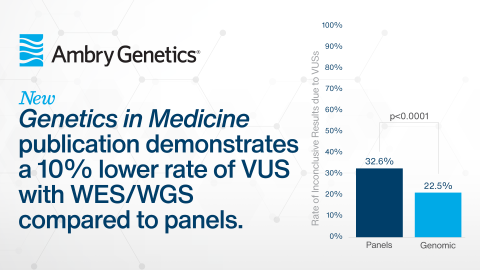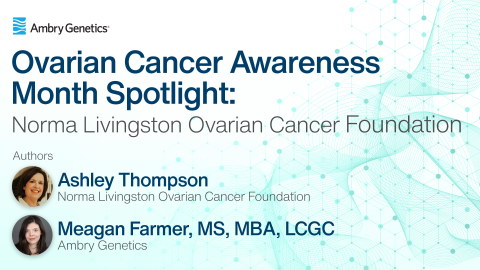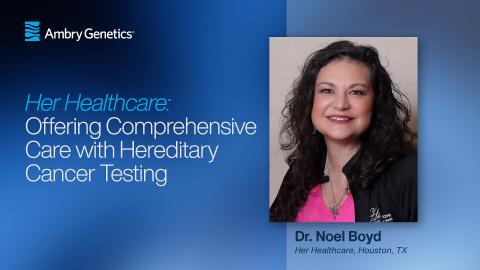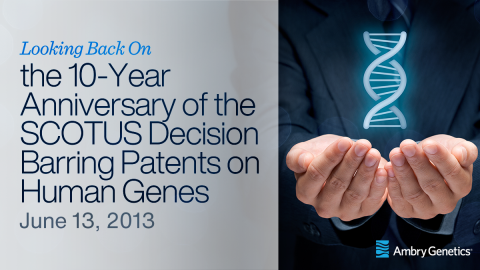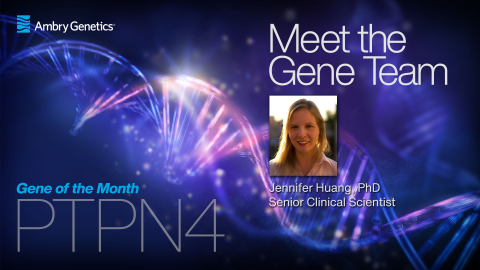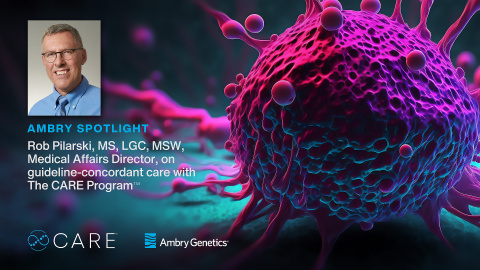- By Meagan Farmer
- Posted September 27, 2023
Ambry Spotlight: BRCAResponder Amy Byer Shainman
Amy Byer Shainman, also known as BRCAResponder, is a patient advocate, author, and producer who provides support and education related to having a pathogenic variant in BRCA1/2 or other cancer predisposition genes. We connected with her ahead of National Previvor Day and Hereditary Breast and Ovarian Cancer Week. Amy’s sister was diagnosed…
- By Meghan Towne, MS, CGC, LCGC
- Posted September 20, 2023
Genetics in Medicine publication demonstrates a 10% lower rate of VUS with WES/WGS compared to panels
Are uncertain results (variants of uncertain significance, or VUS) more likely in multi-gene panels (MGP) or whole exome- and genome-based (WES/WGS) tests? Ambry recently participated in a study led by the Medical Genomic Initiative (MGI) comparing the VUS rates for MGP and WES/WGS. The study, conducted across 19 clinical laboratories in North…
- By Ashley Thompson
- Posted September 14, 2023
Ovarian Cancer Awareness Month Spotlight: Norma Livingston Ovarian Cancer Foundation
Norma was a healthy, active 65-year-old woman who was rarely sick and had always been proactive about her health. She went to her internist complaining of weight gain, abdominal discomfort, and a chronic cough. When the diagnosis was finally made, Norma had stage 4 ovarian cancer. She endured nine hours of surgery, countless rounds of chemotherapy,…
- By Meagan Farmer
- Posted August 2, 2023
Her Healthcare: Offering Comprehensive Care with Hereditary Cancer Testing
Dr. Noel Boyd is an OB/GYN who has been in private practice in a suburb of Houston, TX, for 21 years. The patients seen in her practice, Her Healthcare, range in age from 9 to 99, and she cares for them through everything from routine exams to high-risk pregnancy, from contraception counseling to cancer screening. “I really love taking care…
- By Jodi Tahsler
- Posted June 14, 2023
Passing on a Legacy of Health: Ben Huebsch Shares His BRCA Story for Men’s Health Week
Ben Huebsch was inspired to become an educator because of his mother’s advice to give back to his community. He loves his job as a middle school principal: he gets a front-row seat to the impact a dedicated staff can have on young lives! He is continuing his mother’s legacy by sharing his firsthand experience with BRCA testing for…
- By Dr. Harry Ostrer, M.D.
- Posted June 13, 2023
SCOTUS Tenth Anniversary: Myriad at 10
This week, we are celebrating the tenth anniversary of the Supreme Court’s decision, Association of Molecular Pathology versus Myriad Genetics (“Myriad") that overturned the validity of gene patents. The case was successful, because of some remarkable contingencies, first the conceptualization by ACLU lawyer Chris Hansen and his advisor Tania…
- By Jodi Tahsler
- Posted June 13, 2023
Outlier: Runi Limary Let Her Voice Be Heard on BRCA Gene Patents
When it comes to breast cancer, Runi Limary has more personal experience than average. She not only spent time working at a nonprofit for people with breast cancer, but she was diagnosed herself at the young age of twenty-eight. When ACLU lawyers reached out to her about the court case regarding BRCA1 and BRCA2 patents to see…
- By Morgan Turpin, MB(ASCP), CGMBS
- Posted June 8, 2023
Morgan Turpin and Son Shayne Find Connection with Dravet Syndrome Families
Morgan Turpin, MB(ASCP), CGMBS, Technical Systems Manager, is an Ambry Genetics employee who has firsthand knowledge of the benefits of exome testing. Her son Shayne went through a diagnostic odyssey of his own before he was a toddler. Exome testing opened up many possibilities for the family, including an online community and treatment options.…
- By Jodi Tahsler
- Posted May 18, 2023
Meet the Gene Team: Jennifer Huang, PhD, presents the Gene of the Month, PTPN4
Meet the Gene Team The Gene Team is an essential part of Ambry Genetics. This passionate team of experts is inspired by advancing the science of gene characterization and being able to help patients. For our third installment, we would like to introduce Jennifer Huang, PhD, Senior Clinical Scientist at Ambry Genetics. Dr. Jennifer Huang is a…
- By Jodi Tahsler
- Posted April 12, 2023
Ambry Spotlights Rob Pilarski: Seeing Genetic Testing’s Big Picture
Ambry Genetics caught up with Robert Pilarski, MS, LGC, MSW, Director of Medical Affairs, at his home on the shore in Cape Cod. He describes the town as “his happy place,” and in learning more about his role at Ambry, it seems that his career has entered a happy place as well. Rob has been with Ambry for over two years and is often sought…

